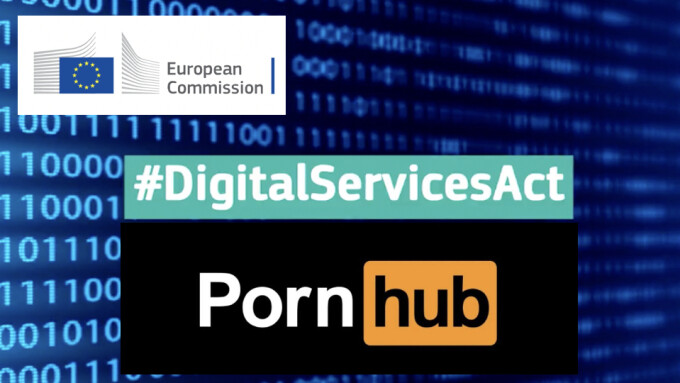BRUSSELS — The European Commission, the EU’s executive body, has designated adult platforms Pornhub, Stripchat and XVideos as “very large online platforms” (VLOPs) and therefore subject to special regulations under the controversial Digital Services Act (DSA).
The DSA classifies platforms that reach at least 45 million average monthly active EU users as VLOPs. In an official announcement posted Wednesday, the Commission stated that its investigation had determined that the three adult sites meet that threshold.
Pornhub questioned the data the Commission used to justify the measure.
“As of July 31, 2023, Pornhub has 33 million average monthly recipients of the service in the European Union, calculated as an average over the period of the past six months,” a Pornhub spokesperson told the New York Post.
As XBIZ reported, in October a group of European NGOs co-signed a letter penned by Italian digital rights attorney and activist Alessandro Polidoro, urging the Commission to investigate the self-reported data of the top adult sites and to reclassify them as VLOPs.
The Commission initially excluded adult sites from its April decision designating 19 high-profile platforms and search engines as VLOPs.
In addition to abiding by the DSA’s general provisions, within four months of their designation as VLOPs, Pornhub, XVideos and Stripchat “will also have to adopt specific measures to empower and protect users online, including minors, and duly assess and mitigate any systemic risks stemming from their services,” the Commission’s announcement explained.
Online platforms and search engines have until Feb. 17 to comply with all DSA obligations, both general and specific to the VLOP category.
DSA Obligations May Lead to Chilling Free Speech
General DSA obligations include providing “user-friendly mechanisms to allow users or entities to notify illegal content; statements of reasons to users when their content is restricted or removed; an internal complaint-handling system for users to appeal content moderation decisions” and “prioritizing the treatment of notices submitted by so-called ‘trusted flaggers.’”
Most controversially, the DSA compels sites to “promptly inform law enforcement authorities if they become aware of any information giving rise to a suspicion that a criminal offence involving a threat to the life or safety of a person has taken place, is taking place or is likely to take place, including in the case of child sexual abuse.”
As digital rights activists have pointed out, the obligation to become informants for law enforcement creates such vague liability for platforms and sites that it will most likely lead to a chilling of free speech, as they would overcensor due to fear of litigation or state intervention.
The EU does not have blanket free speech protections such as those offered in the U.S. by the First Amendment, or anything resembling Section 230 protections for user-generated content.
Specific Obligations for VLOPs
The additional, specific obligations for VLOPs include a mandate to conduct risk assessment and enact mitigation measures “to address risks linked to the dissemination of illegal content online, such as child sexual abuse material, and content affecting fundamental rights, such as the right to human dignity and private life in case of non-consensual sharing of intimate material online or deepfake pornography. These measures can include adapting their terms and conditions, interfaces, moderation processes, or algorithms, among others.”
VLOPs, the Commission’s statement continues, must design their services “to address and prevent risks to the well-being of children” and must “protect the rights of the child, and prevent minors from accessing pornographic content online, including with age verification tools.”







